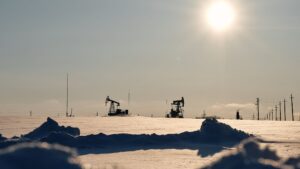When it comes to an oil and gas lease, there are some different clauses that come into play and the dry hole clause is one of them. The dry hole clause is associated with the rent payments in the event of a dry well.
What Is A Dry-Hole Clause?
A dry-hole clause is an oil and gas clause that specifies what the lessee has to do in order to maintain the lease for the remainder of the primary term after a dry hole or unproductive well has been initially drilled.
What Is The Purpose Of Including A Dry-Hole Clause In An Oil And Gas Lease Agreement And Why Is It So Important?
The purpose of the dry hole clause is to keep the lease in force during the primary term even after a dry well has been drilled. The lessee is required to drill a new well within a specified time.
This provision helps to allocate the costs and risks that are involved with drilling for oil and gas on the leased premises in a case where the lessee does not discover a viable resource.
How Does A Dry-Hole Clause Protect The Lessee And Lessor In An Oil And Gas Lease?
Say the first well drilled is a dry hole and there is intended commencement of a second well on the land covered by the lease before the next anniversary which follows the completion of the well, then the board can have the lease terminated.
This can be prevented if the lessee resumes payment of any delay drilling penalties imposed on or before such anniversary. When there is an active payment resumption of the required delay drilling penalties in line with continued payment, then the lease continues in effect during the primary term as if there hadn’t been any interruption in the delay drilling penalty payments.
Common Terms That May Be Included In A Dry-Hole Clause
These are some of the terms that are associated with a dry hole clause;
- Arbitration: Any dispute that arises due to the dry-hole clause may be subject to arbitration instead of litigation.
- Extensions: Even if the clause is invoked, the lessor could be allowed to extend the lease period or require the lessee to keep drilling.
- Abandonment: If the dry hole clause is invoked by the lessee, then they should abandon the well.
- Rental Fees: The lessee might need to pay delay rentals until they revoke the dry hole clause or they find oil or natural gas in paying quantities.
- Notification: If the lessee intends to invoke the dry hole clause, then they must notify the lessor in writing.
- Time Limit: There could be a specific time limit in the dry hole clause, which signifies how long the lessee has to check if the well is productive.
- Paying Quantities: This is the required amount of oil or natural gas that should be found before the well is considered commercially viable.
Dry-Hole Clause Examples
Example 1
- In a case where the well drilled by the lessee is unproductive and doesn’t produce oil or gas in paying quantities, the lessee has the right to leave all infrastructure or equipment on the lease site without any additional liability to the lessor. A written note should be provided to the lessor within 30 days of discovering the unproductive well.
Example 2
- If the lessee drills a well on the leased premises and doesn’t discover oil or gas in paying quantities within 90 days, then the dry hole clause can be invoked, and no further delay rentals on the lease.
Is A Dry-Hole Clause Required?
It is not a must to have a dry-hole clause in an oil and gas lease. However, it is a provision that is put in place to protect the lessee and the lessor. If there is no dry hole clause, then a lessee might be forced to pay delay rentals on an unproductive well or continue drilling in areas without profit.
It could be financially burdensome to the lessor in the sense that he might not get any royalty payments if the lessee doesn’t find oil and gas in paying quantities.
Are There Any Limitations Or Restrictions On The Use Of Dry-Hole Clauses In Oil And Gas Leases?
These are some of the limitations on the use of dry hole clauses;
- If the drilling of the dry hole commenced during the primary term and the lease is not a paid-up one, then the lessee must pay delay rentals unless stated otherwise.
- The lessee is expected to begin drilling another well within the specified date.
Are There Any Common Alternatives To A Dry-Hole Clause In Oil And Gas Leases?
The cessation of production is a provision that acts similarly to the dry-hole clause. This clause perpetuates a lease for a given period of grace if the well halts production in a case where the lease would otherwise be terminated.
Conclusion
The dry-hole clause is a very useful provision in oil and gas leases that helps to protect both parties involved in the case where an unproductive well is drilled.






Leave a Reply